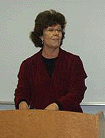Dr. Sheila Smith on Japan's Political Change and Japan-US Alliance
Takahiro MIYAO (Professor and Head, Japanese Institute of Global Communications, IUJ)
| Temple University: ICJS Event
|
| Date/Time: | November 6, 2007 (W) 19:30 - 21:30 |
| Place: | Temple University, Japan Campus, Mita Hall |
| Program: |
19:30 - 20:30
Speakers: Sheila Smith (Adjunct Senior Fellow, Council on Foreign Relations, and Visiting Fellow, Keio University): "Political Change in Japan: A Challenge to the Japan-US Alliance?"
20:30 - 21:30
Q&A
|
| Organizer: | Temple University-Japan Campus, Korea Japan Group |
 On November 6, Dr. Sheila Smith gave a presentation on Japan's politics and the Japan-U.S. Alliance at Temple University-Japan's Mita Hall. The seminar was organized by Mr. Robert Dujarric, representing the Korea Japan Group at the Institute of Contemporary Japanese Studies (ICJS). On November 6, Dr. Sheila Smith gave a presentation on Japan's politics and the Japan-U.S. Alliance at Temple University-Japan's Mita Hall. The seminar was organized by Mr. Robert Dujarric, representing the Korea Japan Group at the Institute of Contemporary Japanese Studies (ICJS).
First of all, Dr. Smith asked if political change in Japan is necessarily bad for the Japan-U.S. Alliance, a question which is implied by her speech title "Political Change in Japan: A Challenge to the Japan-U.S. Alliance?" While it might appear that the imminent downfall of the ruling Liberal Democratic Party (LDP), which has consistently been a strong supporter for the U.S., should be bad for the Alliance, Dr. Smith gave a surprising answer, "no," to this question.
Her point is that if we go back and look at the historical evidence in the postwar Japan, we find that the periods of political change, or political "crises," say, in the early 1950s, the early 1970s and the 1990s, were quite fertile for Japan's defense policy and the Japan-U.S. relations in the sense that there were more active and engaged discussions on Japan's national defense and more clarifications of the government's policy and the LDP's stance on national security, which were highly appreciated by Washington.
In this context, Dr. Smith pointed out that the negative effect of the interruption of Japan's refueling activities in the Indian Ocean should not be overblown, because Japan's commitment to the bilateral alliance with the U.S. will not be judged by this single episode. Rather, more broad issues such as Japan's principle and terms for use of the Self-Defense Forces overseas are carefully watched by the U.S. administration. Therefore, it is vital for not only the LDP but also the DPJ to clarify their respective defense policies in relation to the Alliance and the U.N., according to Dr. Smith.
After her presentation, active discussions followed as to what else Japan can and should do to strengthen Japan's national security and the Japan-U.S. Alliance.
Reference:
ICJS Event Notice: About Sheila Smith:
http://www.tuj.ac.jp/newsite/main/news/
specialevents/events_2007/events_071106.html
|





